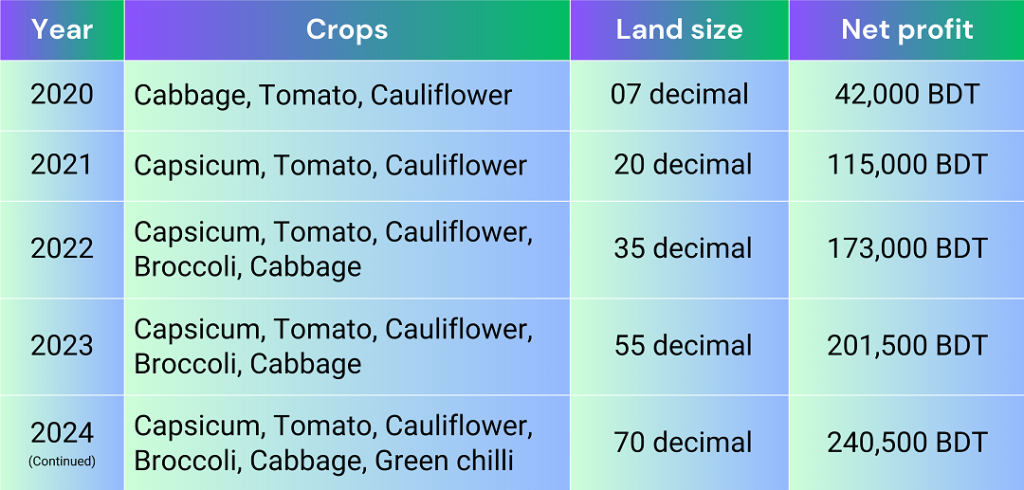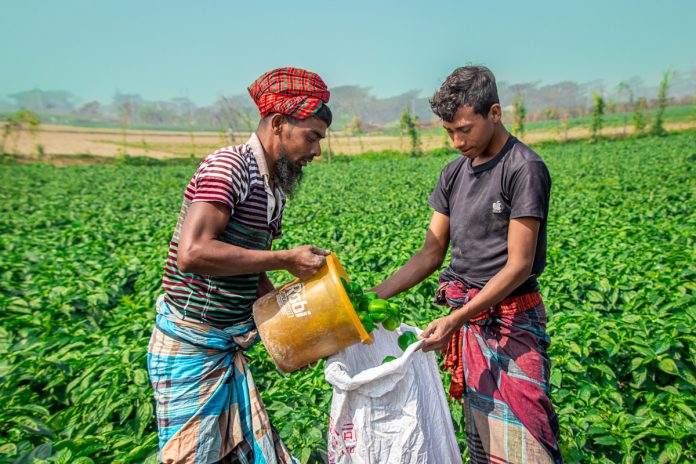Josna Begum (31) is a resident of Bhola, one of the most climate-vulnerable districts in Bangladesh, which faces frequent cyclones, tidal surges, and salinity. She and her family reside in Majher Char of Kachia Union, an estuary island where almost 70% of the area remains submerged for at least five months during the monsoon and has limited public transportation facilities.
Her family relocated here almost fifteen years ago, losing their homestead and everything to river erosion. Despite the hardships, Josna received a home from the government’s ‘Ashrayan Project’ and her husband, Alauddin, used to earn a little by fishing in the river. However, as a single breadwinner, he could hardly feed the family three meals daily.
Ever since they moved here, Josna, a mother of three—one daughter and two sons—has found her family trapped in poverty again with minimal livelihood options on the island. She yearned for an opportunity to break free from her intergenerational poverty, and then she found the PPEPP-EU project.
Initially, Josna cultivated vegetables on a small piece of land for household consumption. However, with the guidance of PPEPP-EU’s technical staff, she transitioned to large-scale high-value vegetable cultivation. This initiative promotes nutritious food intake and creates livelihood opportunities at home. Over the years, this technology has proven to be a successful and exemplary income-generating activity for extremely poor households, significantly contributing to their family income and nutritional needs.
In early 2021, Josna received a significant boost—a 10,000 BDT grant from Grameen Jano Unnayan Sangstha (GJUS), a downstream partner of the PPEPP-EU project. She also received the project’s seeds, fertilisers, pesticides, and other input support and started cultivating high-value vegetables such as capsicum, broccoli and cauliflower.
Josna shared, “We were so surprised to see the profit we made in the first year. But this yield truly encouraged us to move forward with vegetable production.” The table below suggests that Josna’s production and profit have significantly increased over the years.

Her husband received hands-on training in vegetable cultivation and technical knowledge on bed preparation, fertiliser application and pest prevention for higher yields. PPEPP-EU’s technical and assistant technical officers also visit participant households to provide hands-on technical assistance for vegetable cultivation and ensure a good harvest.
Meanwhile, Alauddin received a three-day entrepreneurship training on vegetable cultivation and now sells their produce directly to the seller through the Agriculture Services and Marketing Hub established in their community by PPEPP-EU.
Using her earnings to multiply her livelihood options, Josna has made 23 chickens, 15 ducks, three goats, and two cows. Rearing livestock at home allows her to make about 1200 Taka monthly.
“I would never have come this far without the effort of the PPEPP-EU project, and I do not know how to thank you all for your continuous support,” said Josna. Like her, many in her community are now interested in taking vegetable cultivation as an income-generating activity.


